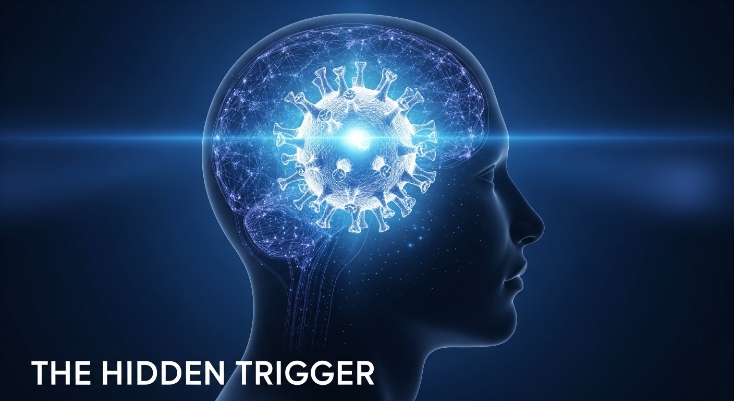A shocking discovery is reshaping our understanding of the link between a common virus and dementia, revealing that a hidden virus from childhood could play a critical role in developing Alzheimer’s disease later in life. Researchers have identified Human Herpesvirus 6A (HHV-6A), a virus that infects nearly everyone in their youth, as a potential trigger for the devastating brain decline associated with dementia. This critical breakthrough helps explain the mysterious origins of Alzheimer’s and highlights the urgent need to focus on lifelong brain health.
The Hidden Intruder: How a Childhood Virus Attacks the Brain
Nearly 100% of people are infected with Human Herpesvirus 6 (HHV-6) as children, where it often causes a mild illness like roseola. The virus then travels to the brain and lies dormant for decades. The new research focuses on a specific variant, HHV-6A. Studies suggest that as we age, this dormant virus can reactivate. When it does, it can trigger a cascade of damaging effects, including inflammation and accelerating the formation of amyloid beta plaques—the sticky proteins that are a key hallmark of Alzheimer’s disease.
The “Viral Link”: Accelerating the Path to Dementia
Scientists believe the virus doesn’t necessarily cause Alzheimer‘s on its own, but it acts as a powerful accelerator. In lab models using brain cells, researchers found that the presence of the HHV-6A virus dramatically sped up the formation of amyloid plaques. This suggests the viral link could be a key reason why some people develop dementia while others do not, even if they have other risk factors.
The Scale of the Risk: 1 Common Virus, Decades of Damage
The connection between this single, incredibly common virus and dementia is a game-changer for medical research. It reframes Alzheimer’s not just as a disease of old age, but as the potential end-product of a lifelong process that can begin with a childhood infection.
- The Virus: Human Herpesvirus 6A (HHV-6A), a variant of a virus that infects almost everyone.
- The Mechanism: The virus lies dormant in brain cells for years.
- The Trigger: Reactivation in later life leads to inflammation and the production of amyloid plaques, a core component of Alzheimer’s.
- The Result: The disease process is significantly accelerated, leading to cognitive decline and dementia.
You Can’t Stop the Virus, But You Can Protect Your Brain
While the news of a hidden virus may sound alarming, experts emphasize that this discovery empowers us. There is currently no vaccine for HHV-6, so you can’t prevent the initial infection. However, you can take proactive steps to strengthen your brain’s resilience and potentially keep the virus dormant. The focus is on creating an environment in your brain where inflammation is low and neurons are healthy.
Key strategies for brain health include:
- Regular Exercise: Physical activity is proven to reduce brain inflammation.
- A Brain-Healthy Diet: The MIND and Mediterranean diets, rich in leafy greens, berries, nuts, and fish, are strongly linked to a lower risk of dementia.
- Quality Sleep: During deep sleep, the brain clears out toxins like amyloid beta.
- Stress Management: Chronic stress contributes to inflammation, which may help reactivate the virus.
The Future of Alzheimer’s Treatment
This groundbreaking research into the viral link opens up exciting new possibilities for treating and potentially preventing Alzheimer’s disease. If a dormant virus is a key trigger, future treatments could involve antiviral medications designed to suppress HHV-6A reactivation in at-risk individuals. This could one day provide a powerful new tool in the fight against dementia, moving beyond simply managing symptoms to targeting one of the root causes of the disease.
Conclusion
The critical link between a common childhood virus and dementia is one of the most important medical discoveries of our time. It reveals that the seeds of Alzheimer’s may be planted decades before the first symptoms appear, giving us a new and urgent reason to prioritize our brain health throughout our entire lives. While the thought of a hidden virus is unsettling, this knowledge is power. By focusing on proven strategies like diet, exercise, and sleep, we can take action today to build a more resilient brain for tomorrow.






